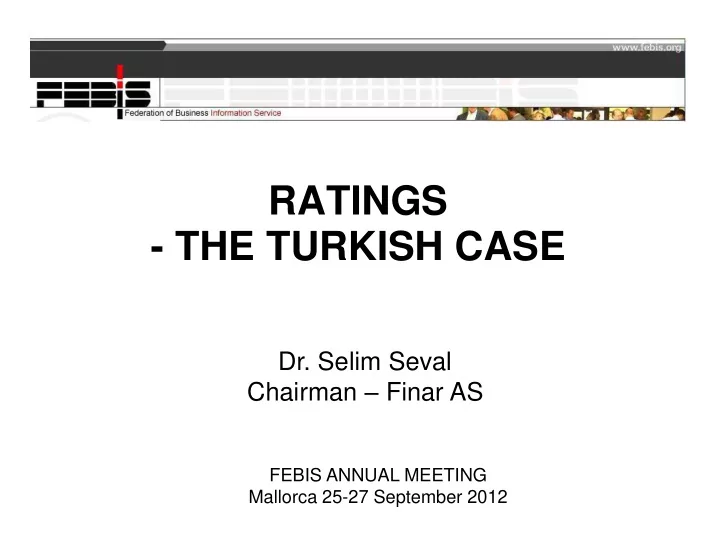

RATINGS - THE TURKISH CASE Dr. Selim Seval Chairman – Finar AS FEBIS ANNUAL MEETING Mallorca 25-27 September 2012
Evolution of the legislative framework Banking Perspective • Until 1986, there was no regulation in the banking system, which was then regulated by the Turkish Central Bank and supervised by the Turkish Treasury, to allocate provisions for loan losses and to write off bad loans. • In 1986, the decree on loan loss provisions was issued. It was with this decree that the banks were introduced for the first time officially with the credit risk management concept. • In 1989, Turkish banks were required to calculate their capital adequacy ratio according to Basel I.
Evolution of the legislative framework • Only after having to survive two major financial crises with almost half of the banks going bankrupt due to non-performing commercial loans in 1994 and 2000, the system felt the need to take credit risks seriously. • In 2000, the Banking Regulation and Supervision Agency (BRSA) was established. With elaborate roadmaps and decrees geared to adopting Basel II principles in mitigating credit risks, the Agency was brought to the pinnacle of the system.
Evolution of the legislative framework • In 1986, major Turkish banks ventured into consumer banking with credit cards and consumer loans. In 1993, the Credit Bureau of Turkey was founded. • Building on its experience and expertise in the consumer information business, the Credit Bureau started to operate a commercial credit database in 2011.
Evolution of the legislative framework Banking Regulation and Supervision Agency • It was very late for the Turkish banking system to have a regulatory and a supervisory body other than the Central Bank and the Turkish Treasury. The Banking Regulation and Supervision Agency (BRSA) was founded in 2000. • BRSA is the government authority in Turkey to authorize External Credit Assessment Institutions. BRSA calls an external credit assessment institution a rating institution. In 2006, BRSA has issued a Communiqué about the Operations and Authorization of Rating Institutions in Turkey.
Evolution of the legislative framework • BRSA published a Communiqué on Banks’ Internal Audit and Risk Management Systems in 2001. • In 2003, Basel II Orientation Committee was founded and a draft roadmap for adopting Basel II was published. • In 2005, the final roadmap was announced. It was initially decided that the banks would adopt the standard method of Basel II in 2007 and the Internal Ratings Based Approach in 2008. • However, this decision was postponed to the beginning of 2009 and later to an indefinite time with reasons that the banks were not ready and qualified external credit assessment institutions were not operational yet.
Evolution of the legislative framework • After granting non-permanent ECAI licenses to three companies, the BRSA published a revised Communiqué in April 2012 and asked all related parties for re- application. Finar’s long -due application will now be evaluated under the revised regulation. • The new regulation divides ratings into thre categories: 1. Governmental and international institutions and multilateral development banks 2. Companies and projects • Banks and non-bank financial institutions • Debt instruments issued by banks and non-bank financial institutions • Companies of all sizes and debt instruments issued by these • Project finances 3. Structured debt instruments
Evolution of the legislative framework Capital Markets Perspective Capital Markets Board of Turkey • Capital Markets Board of Turkey (CMB) is the regulatory and supervisory authority in charge of the securities markets in Turkey. • Empowered by the Capital Markets Law, which was enacted in 1981, the CMB issues regulations for organizing the markets and developing capital market instruments and institutions.
Evolution of the legislative framework • The CMB is also entitled to regulate all issues pertaining to ratings and rating agencies that are authorized by the CMB according to the Communiqué published three years earlier than BRSA’s in 2003. • The definition and scope of the rating activity are almost the same as they are stated in BRSA’s decree on rating. According to CMB’s regulation, rating activities include credit rating and the rating of compliance with corporate governance principles. Obtaining a rating is optional. However, it may be mandatory under circumstances where it is deemed necessary by the CMB.
Current Market Scenery BRSA Space • Back to square one. Finar and other potential ECAIs will re- apply. It should take about 6 months to see the emergence of ECAIs in Turkey. • International big names are not expected to apply for ECAI license as BRSA is trying to promote local initiatives. • With a recent Decree, the BRSA promulgated the BASEL II application start-up date as the beginning of July 2012. A realistic application date should not be anytime before mid- 2013.
Current Market Scenery CMB Space Currently, there are 6 locally established and 3 international rating companies licenced to operate in the capital markets of Turkey. Licenced Companies International with Local Presence Companies Authorised to Operate Locally 1- Fitch Ratings 1- Standards and Poor's 2- JCR 2- Moody's Investors Service 3- Fitch Ratings 3- TCR 4- Saha 5- Kobirate 6- TURKRATING
Thank you
Recommend
More recommend